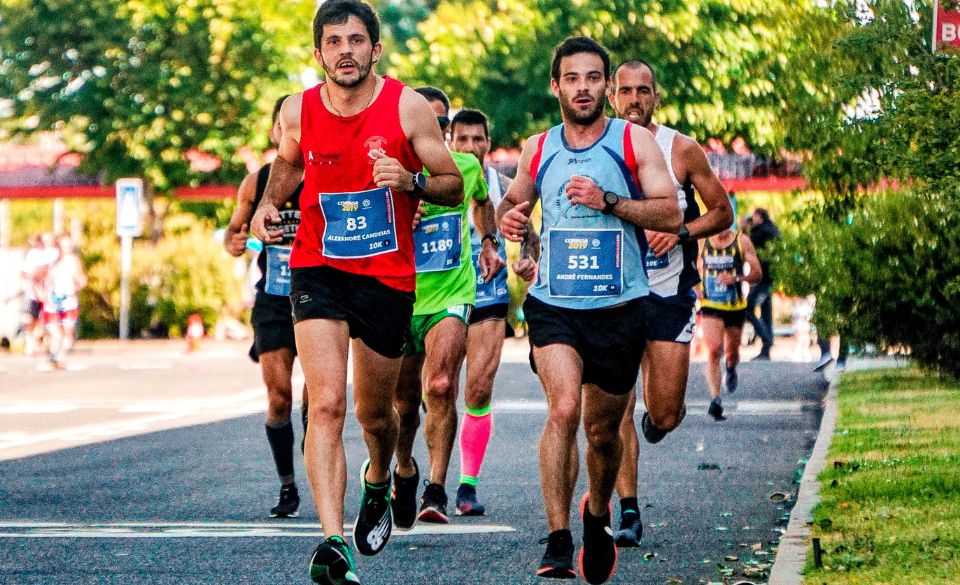
How Far Should You Run Before A Half Marathon?
Page Contents
The half marathon stands as one of the most favored race distances for runners, appealing to individuals of diverse experience levels and abilities. Some aspire to merely cross the finish line, while others set their sights on achieving a personal record (PR). When it comes to preparing for a half marathon, the training approach can differ significantly based on your prior experience and objectives. Factors such as your weekly mileage, running frequency, and the distance covered prior to the half marathon hinge on your existing fitness level and background.
In this guide, we aim to assist you in determining the appropriate distance to cover in preparation for a half marathon. We begin by examining prevalent training practices and consulting the latest research findings before offering comprehensive guidelines. To conclude, we provide recommendations on how to progressively increase your long run distance as you embark on your half marathon training journey.
What Distances Do Common Training Methods Advocate Before A Half Marathon?
Many introductory training plans are primarily designed to help runners complete a half marathon rather than pursue a specific finishing time. Consequently, most of these plans do not include the complete half marathon distance within their training regimen.
– The Hansons Half-Marathon Method Beginner Plan prescribes long runs of up to 12 miles (approximately 19-20 kilometers). Throughout the program, runners alternate between 10-mile (16-kilometer) and 12-mile long runs on a weekly basis.
– Hal Higdon’s Novice 1 Half Marathon Training Plan culminates with a 10-mile long run (about 16 kilometers) scheduled for the week leading up to the race. In his Novice 2 Half Marathon plan, participants tackle a 12-mile (approximately 19-kilometer) long run in the same timeframe.
– Jeff Galloway’s Run-Walk Half Marathon beginner plan gradually advances participants to 14 miles (approximately 22.5 kilometers) using run/walk intervals, two weeks before the race.
– The McMillan Running Novice 1 Plan’s pinnacle features a long run lasting 105-120 minutes.
Moreover, several of these training methodologies cater to intermediate and advanced runners. In these advanced plans, a typical maximum long run distance ranges around 14 miles.
– Hal Higdon’s Advanced Plan reaches a peak long run duration of 2 hours, which can translate to 13 miles or more, depending on the individual’s pace.
– The Hansons Half Marathon Method attains a peak long run of 14 miles in its advanced plan.
– McMillan Running’s intermediate/advanced plan culminates with long runs spanning 14-18 miles (approximately 25-30 kilometers).
Nonetheless, as seasoned runners are well aware, individualized training can significantly deviate from standardized training programs. Therefore, it is crucial to ascertain the ideal long run distance before a half marathon, contingent upon your specific training history and current physical condition.
The Science Underlying Long Runs in Half Marathon Training
In a 2020 study featured in the Scandinavian Journal of Medicine and Science in Sports, researchers probed the impact of training volume and the length of the longest run in preparation for half marathons on both race performance and the occurrence of running-related injuries. To conduct their investigation, they enlisted a sample group of 556 half-marathon runners and subjected them to rigorous statistical analyses based on questionnaires and race results. Among the participants, 61% were male, 39% were female, and they boasted an average of five years of running experience.
The results of the statistical scrutiny unveiled that the extent of the longest run during half marathon training did indeed exert an influence on race outcomes. Remarkably, this influence did not coincide with an increased risk of sustaining running injuries. Half marathon participants who completed their longest training run covering less than 15 kilometers (approximately 9.3 miles) achieved an average finishing time of 2 hours, 6 minutes, and 48 seconds. In contrast, those who ventured into the realm of 15-21 kilometers (9.3-13 miles) for their longest runs crossed the finish line with an average time of 2 hours, 3 minutes, and 28 seconds. Interestingly, only 26.3% of the participants tackled training runs exceeding 21 kilometers (13 miles), yet they secured an average finish time of 1 hour, 51 minutes, and 31 seconds.
Furthermore, the length of the longest long run exhibited a correlation with enhanced fatigue resistance, a vital attribute denoting the ability to maintain pace and intensity even as fatigue sets in. Runners who undertook longest runs less than 15 kilometers and those in the 15-21 kilometer category displayed a decline in pace by 10.3% and 12.1%, respectively. In contrast, those who ventured beyond the 21-kilometer mark experienced a more modest reduction of 9.4%.
Crucially, it is worth noting that while the longest long run plays a substantial role in half marathon performance, it is not the sole determinant. The same study identified a link between training volume and finishing time, emphasizing that training intensity, including any long run workouts, also exerts an impact on race performance. Thus, the longest run stands as a contributor to half marathon success.
How Far Should You Cover Before a Half Marathon?
The ideal distance of the longest run before a half marathon hinges on your training background and current fitness level. The approach to half marathon training varies significantly between a first-time half marathoner and a seasoned marathon veteran.
For novice runners, those with less than a year of running experience or no prior long-distance running, the focus should be on gradually building up their long run distance over a span of 14-16 weeks. The emphasis here is on acclimatizing their metabolic and musculoskeletal systems, as well as their mental endurance, to the demands of long runs. If your longest run to date has not exceeded 6 miles, consider a gradual progression to a longest run of 10-11 miles (approximately 16-17 kilometers) over these weeks. It may be necessary to repeat certain distances for multiple weeks before advancing.
(Note: While some individuals under close coaching supervision have achieved distances of up to 13 miles before their first half marathon, this is not typical for novices.)
On the other hand, if you’ve been running for several years and can comfortably cover 8 miles (12-13 kilometers) before commencing half marathon training, you may aspire to reach 12-13 miles (approximately 19-21 kilometers) in training prior to race day.
Experienced runners who have completed half marathons previously possess the biomechanical and metabolic adaptations required for longer training runs, including distances exceeding the half marathon race itself (i.e., 14-16 miles). These over-distance long runs serve to bolster fatigue resistance and endurance.
The frequency and precise length of these extended long runs depend on individual athletes. An intermediate runner targeting a 2-hour half marathon may incorporate a single 14-mile long run (approximately 23 kilometers) into their training. In contrast, a seasoned half marathoner aiming for a 1:30 finish may undertake multiple 14-16 mile (approximately 23-26 kilometers) long runs, complemented by long run workouts.
To summarize: The recommended longest run distances before a half marathon are as follows:
Novice: 10-11 miles (approximately 16-17 kilometers)
First-time half marathoner (with a running base): 12-13 miles (approximately 19-21 kilometers)
Intermediate: 13-14 miles (approximately 21-23 kilometers)
Experienced: 14-16 miles (approximately 23-26 kilometers)
Mastering Longer Distances in Half Marathon Training
If you’re grappling with the challenge of conquering lengthy runs during your half marathon training, rest assured that you’re not alone in this endeavor. Many runners encounter similar hurdles, but with the right strategies, you can stride past them and emerge stronger.
Pace Yourself: It’s crucial to find the right rhythm for your long runs. If you often finish them feeling utterly drained, it might be an indication that you’re pushing too hard. Consider slowing down your pace. There’s no such thing as going too easy on long runs. In fact, aiming for a pace where you can comfortably chat with running companions or running 1.5-3 minutes per mile slower than your goal pace is a wise approach.
Fuel Adequately: Running on empty can leave you feeling sluggish and fatigued. Don’t reserve fueling solely for marathon training; it’s equally vital for half marathons. For long runs surpassing 80-90 minutes, aim for around 40-60 grams of carbohydrates per hour. If your run extends beyond 2.5 hours, consider increasing your carb intake to as much as 90 grams per hour. There are various options for intra-run nutrition, including gels, chews, whole foods, and sports drinks. Initiate your fueling strategy early and maintain a consistent schedule, such as refueling every 30 minutes during your run. (For more insights on proper fueling, explore our comprehensive article on the subject.)
Stay Hydrated: Dehydration can hinder your training progress rather than enhancing it. Thickening your blood, stressing your nervous system, and overexerting your body won’t make you a mentally tougher runner. To avoid these pitfalls, bring along fluids with added electrolytes for your half marathon long runs. Tailor your hydration to your individual sweat rate, and if you’re uncertain, consider undergoing a sweat test to determine your specific needs.
Engage with Audiobooks: To stave off boredom and keep your mind engaged during long runs, consider immersing yourself in an audiobook. A captivating story can transport you to another world, making those extended miles pass more swiftly. Whether you enjoy discovering new narratives or revisiting cherished tales, audiobooks can be a valuable companion during your long runs.
Final Words – How Far Should You Run Before A Half Marathon?
In conclusion, the half marathon holds a special place as one of the most beloved race distances among runners, attracting individuals of all backgrounds and skill levels. Whether your goal is simply to cross the finish line or to achieve a personal record, your approach to half marathon training can vary significantly depending on your experience and objectives. Factors like your weekly mileage, running frequency, and the distance you cover in preparation all hinge on your current fitness level and running history.
This comprehensive guide has aimed to assist you in determining the ideal distance to cover before a half marathon. We began by examining common training practices and delving into recent research findings before providing clear guidelines. As a final note, we’ve offered recommendations on how to progressively increase your long run distance as you embark on your half marathon training journey.
We explored the distances advocated by various training methods before a half marathon, considering both novice and experienced runners. These insights serve as valuable reference points for tailoring your training regimen to your unique circumstances.
The science underlying long runs in half marathon training, as revealed by a 2020 study, underscored the importance of the longest run in influencing race outcomes and fatigue resistance. This study, encompassing a diverse group of half marathon runners, provided valuable insights into how different long run distances can impact performance without increasing the risk of injury.
We then addressed the burning question: How far should you run before a half marathon? The answer, it turns out, depends on your running background and current fitness level. Novices should focus on a gradual buildup of long run distance over several weeks, while experienced runners can push the boundaries further.
Lastly, we discussed strategies for mastering longer distances in half marathon training. These included pacing yourself appropriately, fueling adequately during your runs, staying hydrated, and even turning to audiobooks to keep your mind engaged during lengthy training sessions.
As you apply these strategies and insights to your half marathon journey, remember that perseverance and intelligent training methods are key to your success. Whether you’re a first-time half marathoner or a seasoned runner aiming to break new barriers, your commitment to the process will ultimately lead you to the finish line and beyond.
If you’re contemplating working with a running coach to elevate your half marathon performance, be sure to explore our coaching services and schedule your initial consultation today. Your journey to half marathon excellence awaits!
If you’re considering working with a running coach for your upcoming half marathon, learn more about our coaching services and schedule your initial consultation today!




